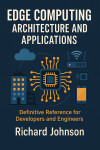Edge Computing Architecture and Applications by Richard Johnson

Synopsis
"Edge Computing Architecture and Applications"
Edge Computing Architecture and Applications provides a comprehensive and authoritative guide to the evolving landscape of edge systems, where data processing is brought closer to sources of data generation for enhanced speed, efficiency, and intelligence. Beginning with a clear exposition of the historical roots, architectural concepts, and foundational principles of edge computing, the book meticulously distinguishes edge, fog, and cloud paradigms, illuminating their interplay through real-world use cases in sectors like IoT, industrial automation, smart cities, and autonomous systems. Readers are introduced to the unique challenges and limitations inherent to distributed edge environments, setting the stage for the advanced material that follows.
The text delves deeply into the design patterns and technical layers that underpin modern edge architecture, from device and gateway hardware, networking infrastructure, and storage solutions to power management and sensor integration. With a focus on resilience and scalability, chapters examine data flow management, hybrid cloud-edge designs, and mechanisms for fault tolerance and redundancy. The networking and communication section addresses low-latency protocols, 5G/6G integration, network function virtualization, bandwidth optimization, routing, and security—equipping practitioners to build robust and secure edge networks for demanding applications.
Beyond architecture, the book provides practical insights into software stacks, orchestration frameworks, and application development tailored for the edge. It explores a variety of programming models, workload partitioning strategies, and AI/machine learning deployment techniques optimized for minimal latency and high reliability. Comprehensive treatment is given to security, privacy, and trust issues, including threat modeling, zero-trust architectures, identity management, and regulatory compliance. Concluding with chapters on reliability, lifecycle management, emerging trends—including edge intelligence, blockchain, standardization, and sustainability—and open research challenges, this volume serves as an indispensable resource for engineers, architects, and researchers building the next generation of distributed computing systems.
Reviews
Write your review
Wanna review this e-book? Please Sign in to start your review.







